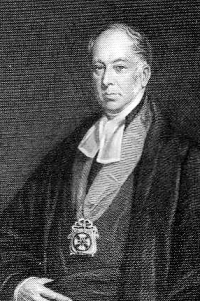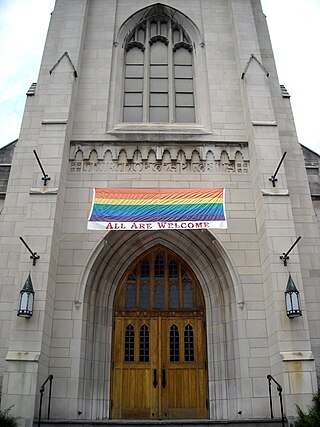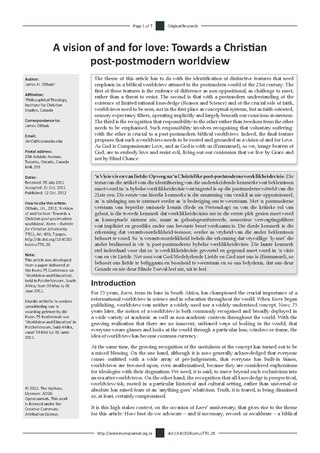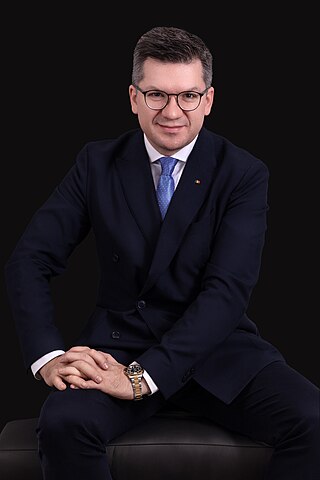
Richard Whately was an English academic, rhetorician, logician, philosopher, economist, and theologian who also served as a reforming Church of Ireland Archbishop of Dublin. He was a leading Broad Churchman, a prolific and combative author over a wide range of topics, a flamboyant character, and one of the first reviewers to recognise the talents of Jane Austen.

In politics, integralism, integrationism or integrism is an interpretation of Catholic social teaching that argues the principle that the Catholic faith should be the basis of public law and public policy within civil society, wherever the preponderance of Catholics within that society makes this possible. Integralism is anti-pluralist, seeking the Catholic faith to be dominant in civil and religious matters. Integralists uphold the 1864 definition of Pope Pius IX in Quanta cura that the religious neutrality of the civil power cannot be embraced as an ideal situation and the doctrine of Leo XIII in Immortale Dei on the religious obligations of states. In December 1965, the Second Vatican Council approved and Pope Paul VI promulgated the document Dignitatis humanae–the Council's "Declaration on Religious Freedom"–which states that it "leaves untouched traditional Catholic doctrine on the moral duty of men and societies toward the true religion and toward the one Church of Christ". However, they have simultaneously declared "that the human person has a right to religious freedom," a move that some traditionalist Catholics such as Archbishop Marcel Lefebvre, the founder of the Society of St. Pius X, have argued is at odds with previous doctrinal pronouncements.

Progressive Christianity represents a postmodern theological approach, which developed out of the liberal Christianity of the modern era, itself rooted in the Enlightenment's thinking. Progressive Christianity is a postliberal theological movement within Christianity that, in the words of Reverend Roger Wolsey, "seeks to reform the faith via the insights of post-modernism and a reclaiming of the truth beyond the verifiable historicity and factuality of the passages in the Bible by affirming the truths within the stories that may not have actually happened."

Ernst Peter Wilhelm Troeltsch was a German liberal Protestant theologian, a writer on the philosophy of religion and the philosophy of history, and a classical liberal politician. He was a member of the history of religions school. His work was a synthesis of a number of strands, drawing on Albrecht Ritschl, Max Weber's conception of sociology, and the Baden school of neo-Kantianism.

Stanley Martin Hauerwas is an American Protestant theologian, ethicist, and public intellectual. Hauerwas originally taught at the University of Notre Dame before moving to Duke University. Hauerwas was a longtime professor at Duke, serving as the Gilbert T. Rowe Professor of Theological Ethics at Duke Divinity School with a joint appointment at the Duke University School of Law. In the fall of 2014, he also assumed a chair in theological ethics at the University of Aberdeen. Hauerwas is considered by many to be one of the world's most influential living theologians and was named "America's Best Theologian" by Time magazine in 2001. He was also the first American theologian to deliver the prestigious Gifford Lectures at the University of St. Andrews in Scotland in over forty years. His work is frequently read and debated by scholars in fields outside of religion or ethics, such as political philosophy, sociology, history, and literary theory. Hauerwas has achieved notability outside of academia as a public intellectual, even appearing on The Oprah Winfrey Show.
Postliberal theology is a Christian theological movement that focuses on a narrative presentation of the Christian faith as regulative for the development of a coherent systematic theology. Thus, Christianity is an overarching story, with its own embedded culture, grammar, and practices, which can be understood only with reference to Christianity's own internal logic.
Postliberalism is an emergent political philosophy that critiques and seeks to move beyond the dominant liberal paradigm of the late 20th and early 21st centuries. Proponents argue that liberalism, with its emphasis on individual rights, free markets, and limited government, has failed to adequately address societal challenges such as economic inequality, environmental degradation, social alienation, family breakdown, and a perceived loss of community and social cohesion.

James Herman Olthuis is an interdisciplinary scholar in ethics, hermeneutics, philosophical theology, as well as a theorist and practitioner of psychotherapy of a kind he calls "relational psychotherapy".
Conservative Christianity, also known as conservative theology, theological conservatism, traditional Christianity, or biblical orthodoxy is a grouping of overlapping and denominationally diverse theological movements within Christianity that seeks to retain the orthodox and long-standing traditions and beliefs of Christianity. It is contrasted with Liberal Christianity and Progressive Christianity, which are seen as heretical heterodoxies by theological conservatives. Conservative Christianity should not be mistaken as being necessarily synonymous with the political philosophy of conservatism, nor the Christian right.

William Sweet is a Canadian philosopher, and a past president of the Canadian Philosophical Association and of the Canadian Theological Society.

Alasdair John Milbank is an English Anglo-Catholic theologian and is an Emeritus Professor in the Department of Theology and Religious Studies at the University of Nottingham, where he is President of the Centre of Theology and Philosophy. Milbank previously taught at the University of Virginia and before that at the University of Cambridge and the University of Lancaster. He is also chairman of the trustees of the think tank ResPublica.
Allen James Reimer was a Canadian Mennonite theologian who held a dual academic appointment as Professor of Religious Studies and Christian Theology at Conrad Grebel University College, a member college of the University of Waterloo, and at the Toronto School of Theology, a consortium of divinity schools federated with the University of Toronto. At the University of Waterloo's fall 2008 convocation, he was named Distinguished Professor Emeritus, an honor seldom bestowed on retired faculty.
Radical orthodoxy is a Christian theological and philosophical school of thought which makes use of postmodern philosophy to reject the paradigm of modernity. The movement was founded by John Milbank and others and takes its name from the title of a collection of essays published by Routledge in 1999: Radical Orthodoxy: A New Theology, edited by Milbank, Catherine Pickstock, and Graham Ward. Although the principal founders of the movement are Anglicans, radical orthodoxy includes theologians from a number of ecclesial traditions.

James Kenneth Alexander Smith is a Canadian-American philosopher who is currently Professor of Philosophy at Calvin University, holding the Gary & Henrietta Byker Chair in Applied Reformed Theology & Worldview. He is the current editor-in-chief of the literary journal Image.
Gerard Patrick Loughlin is an English Roman Catholic theologian and religious scholar. He is Professor of Theology and Religion at the University of Durham, England. He is the author of Telling God's Story: Bible Church and Narrative Theology (1996) and Alien Sex: The Body and Desire in Cinema and Theology (2004).
Graham John Ward is an English theologian and Anglican priest who has been Regius Professor of Divinity at the University of Oxford since 2012.

Phillip Blond is an English political philosopher, Anglican theologian, and director of the ResPublica think tank.
Shaul Magid is a rabbi, Visiting Professor of Modern Jewish Studies at Harvard Divinity School, and Distinguished Fellow in Jewish Studies at Dartmouth College. From 2004 to 2018, he was a professor of religious studies and the Jay and Jeannie Schottenstein Chair of Jewish Studies in Modern Judaism at Indiana University as well as a senior research fellow at the Shalom Hartman Institute. From 1996 to 2004, he was a professor of Jewish philosophy at the Jewish Theological Seminary of America; he was chair of the Department of Jewish Philosophy from 2000-2004.
Simon Andrew Oliver is a British Anglican priest, theologian, and academic. He was formerly Associate Professor of Philosophical Theology at the University of Nottingham, he is now the Van Mildert Professor of Divinity at the University of Durham. Oliver is also on staff with the Centre of Theology and Philosophy.

Mihail Neamțu, is a Romanian conservative politician. He received a PhD in theology from King's College London and has written several books on politics, religion, and culture.











